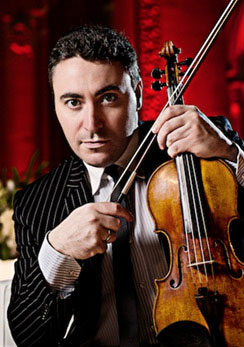Maxim Vengerov on Competitions and Violin Playing by Wah Keung Chan
/ April 1, 2013
Version française...
Flash version here.
 Tell us about your competition experience. Tell us about your competition experience.
MV: I did two competitions in my life: one in Poland, when I was ten and the Carl Flesch Competition, when I was fifteen. I was lucky to win both competitions. For the first, I did not feel stress; it was just another concert for me and I think at the age of ten, children are still not conscious of the competitions. They just like to enjoy themselves and do their best. For the Carl Flesch, I enjoyed the competition but I didnít enjoy competing Ė although I won, it didnít feel right for me at that moment because I didnít take much from the experience, or maybe because I didnít speak English then. Our idea for the Montreal competition is that all participants have to take something with them. Itís either a great memory of meeting people or one of attending concerts. Itís more of a festival feel, so now the competitions have a different meaning.
In my mind, music doesnít fit into the competitive mode because Ė how one is going to judge me, if Iím not as fast as... Thereís always somebody who can play faster, but is that the ultimate goal? Or if Iím going to play one wrong note, how will the jury react? And if somebody played absolutely everything in tune, will they win? And will my musical quality be counted? My idea would be to create a jury that judges objectively as much as possible. What we rely on, of course, is the competence of the jury, with the idea that everyone has their own taste. And thatís what is so good about having many members on a jury.
What should the jury look for?
When I played the caprices, everyone applauded. I think it was rather perfect technically. I spoke to the jury members years later and Ida Haendel [who was on the jury] told me that when I played the Bach chaconnes, it was clear from the musicality who was going to win the competition.
It is a fine balance between musicality and technical ability because the technique is only a means to express interpretation. We look for individuality and then we have to look beyond what we are going to hear today. We want to see all the prizewinners musically active after twenty years.†
The technical level in the world has grown enormously over the last 15-20 years. So now, to find somebody playing perfectly is much easier than 20-30 years ago, but finding a great personality is difficult. Ideally, itís somebody who can express not only themselves through the music of Bach and Mozart, but who tries to deliver the message of the composer, to make a perfect link between the composer and the audience. This is very rare. If you find that, Iím sure most of the jury members can forgive one or two missed notes or passages. Music is not like sports or the Olympics, itís an art. Even imperfection can become perfection.
You told me about individuality but at the same time, you talked about being faithful to the composer. So how do you juggle the two?
Heifetz was Heifetz even when he was playing Bach and Mozart. He used the same vibrato, the same means of expression, but he was brilliant. There are other types of musicians, like Isaac Stern; he was different in Beethoven and in Mozart. He used different colours, different means of expression with the violin and bow, and so these are the two different, contrasting individualities. Still, it takes a very strong personality to deliver the composerís message; until we hear the music come alive, it stays only in the score. Music was written to be recreated every time. Even if I try as much as I can to play Mozart in the way I think that Mozart wanted, it would still be me playing.
For each concert, I have to prepare my body for the performance and I stay open to what might come and let myself be surprised by the music. Yesterday, I played Brahmsís Violin Concerto with the Berlin Philharmonic. During the performance, the orchestra suggested many things to me, different colours, that we had a marvelous chamber music session. It was one of the inspiring moments of my life when I discovered something else in the music of Brahms, even after playing it maybe 100-200 times. Every day is a discovery for me, so I try to prepare myself as much as I possibly can and then you have to let go.
Another point to answer your question is the sound. The sound involves the sound of your finger and the weight of the finger. The sound of musicians, violinists, or pianists, or cellists is like fingerprints. When we hear recordings, we recognize Heifetz, Isaac Stern, and Yehudi Menuhin. Nowadays I wish we could hear more and more personalities that would come with their own sound. Not only interpretation.
In our global world, itís wonderful to be able to listen to millions of recordings, yet it almost leaves us deprived of our own words in music. What weíre going to look forward in this and any competition is to compare the voices, the colours of the instruments, and how they sound, because, for me, the colour of the violin and the sound of the instrument represent the soul of the musician.
Maxim Vengerov headlines the Montreal International Musical Competition (May 7 to 17, 2012). Masterclass, May 12; Violinist in Concert Prestige, May 13; Conductor of the Finals, May 14-15. www.concoursmontreal.ca.
Version française... | |

